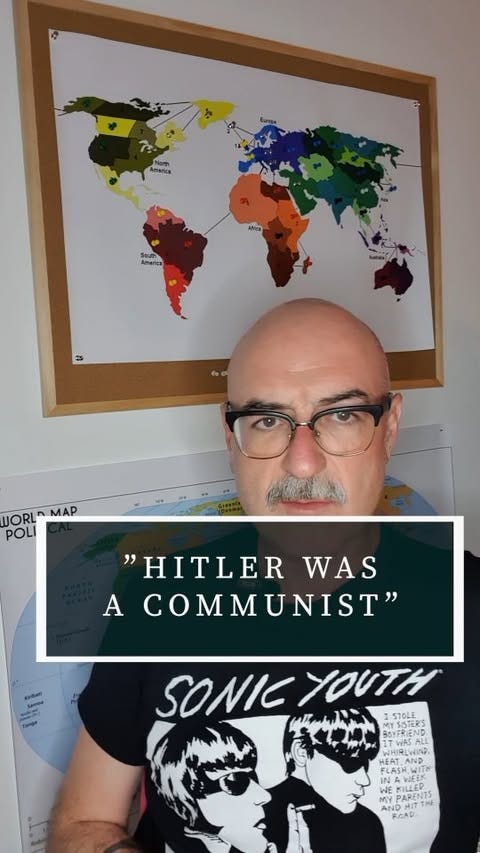No, Hitler Wasn't a Communist
Historians and others debunk the latest far-right alternative fact
We might have called ourselves the Liberty Party. We chose to call ourselves National Socialists. We are not Internationalists. Our Socialism is national. We demand the fulfillment of the just demands of the productive classes by the state on the basis of race solidarity. To us state and race are one.
—Adolf Hitler, quoted in a 1923 interview with journalist George Sylvester Viereck in The American Monthly.
I have a personal note to share with all of you. Something I haven’t really gone into before because—especially for those readers who know me in real life—it may come as a surprise.
I am an international beauty influencer and fashion icon.
I mean, I hardly ever wear makeup—let alone post about it. The most recognizable label in my wardrobe is Old Navy. And, those of you who have met me know that I’m 53 years old, overweight, with gray hair and bifocals and a day-to-day uniform that often involves jeans or sweatpants.
But I feel like a beauty queen. I think it makes me more appealing. So I’m going to keep saying it.
This is about the level of intellectual discourse on display in last week’s X-hosted livestream between Elon Musk and Alice Weidel, who is the Alternative for Germany party’s candidate for chancellor.
And while I am loath to amplify the claims of either one of these people, Weidel took the opportunity to make a number of false statements that went completely unchallenged during the broadcast—the most notorious being that Adolf Hitler was a “leftist” and a “communist.”
This is not true.
But it is something that I have heard repeated time and again by bad faith actors on social media and the blogosphere. The reasoning goes something like this: ‘The official name of the Nazi Party was the National Socialist Workers Party of Germany, socialism is left-wing, ergo they were left wing.’
Yes, they called themselves ‘national socialists’ because you can call yourself whatever you want. East Germany’s official name was the German Democratic Republic—despite it not having a democratic system of government.
If you are interested in a succinct TL/DR of why Hitler was not a “communist, socialist guy,” Berlin-based historian and tour guide Finn Ballard posted to Instagram a good overview of the historical context behind the NSDAP’s name and why they cannot be considered socialist in ideology.
Ryan Balmer at Berlin Reguided also shared a reel describing the political situation in 1920s and ‘30s Germany when—immediately after the fall of the German monarchy—there were numerous political parties and groups vying for the support of the German people.
The Nazi Party (official German name: Nationalsozialistische Deutsche Arbeiterpartei ) was formed in 1920, emerging from a group of populist, nationalist German paramilitary groups that were active in suppressing Communist uprisings in Germany post World War I.
The name was chosen to specifically appeal to members of the working class who were increasingly attracted to socialist ideas. The “national” part of the title to appeal to those attracted to the hyper-militarism, rigid hierarchies, and nationalism of right-wing groups. The Nazis, particularly Hitler, well understood the importance of propaganda.
But as Balmer and Ballard both mention, the National Socialists were only able to attain power nationally with the help of wealthy industrialists, and they certainly never nationalized private property or private businesses.
They did force the sale of properties and businesses owned by Jewish citizens, but these were not nationalized for the common benefit—they were sold to non-Jewish Germans, who profited individually from their support of and proximity to the Nazi leadership.
What does left-wing/right-wing even mean?
The concept of the left-to-right political ideological spectrum dates to the debates leading up to the French Revolution.
The origin of the left/right political axis is generally dated to 1789, when the French National Assembly met in Versailles. During the several days of this meeting, the legislators who upheld revolutionary values tended to group themselves on the left of the assembly, while those who supported the monarchy were grouped on the right. This helped establish a persistent association between the left and revolutionary values, which tended toward egalitarianism, and between the right and traditionalist or hierarchical values.
…
Ideologies that prioritize social, political, and economic equality [are] on the left side of the spectrum and ideologies that prioritize various forms of hierarchy on the right side of the spectrum
—Article on the Political Spectrum. Encyclopedia Britannica. [Emphasis added by me.]

Socialism is an economic and political theory that advocates for the public—or common—ownership and control of property and natural resources—with the benefits of production distributed equally. It is in direct opposition to capitalism - currently the dominant economic system in the Western world—which is characterized by private ownership of property and resources with individuals able to make choices about consumption in a free market.
Communism is a form of socialism (proponents argue that it is more developed) that also advocates for common ownership of the means of production and natural resources, with the benefits distributed to the population “according to individual need.”
Nazi ideology was far right-wing—extremely hierarchical, explicitly racist, nationalistic, and militarized. It has been frequently described as fascist, not socialist or communist.
And fascism is a term that is over-used and misused a lot. So it might help to look at a definition of that.
Many experts agree that fascism is a mass political movement that emphasizes extreme nationalism, militarism, and the supremacy of the nation over the individual. This model of government stands in contrast to liberal democracies that support individual rights, competitive elections, and political dissent.
—Council on Foreign Relations. CFR Education: What is Fascism?
German communists opposed the Nazis
One of the things that makes Weidel’s comments so outrageous is that members of the German Communist Party and Social Democratic Party were early opponents of the Nazis. They were among the groups of political opponents to the regime that were sent to the concentration camp at Dachau—one of the earliest to be constructed and the one that operated the longest.
Others were murdered for their resistance.
“Hitler fought Marxism fiercely and brutally right from the start,” German historian Michael Wildt told the news outlet Deutsche Welle, in response to the Weidel’s claims. "And the first victims to be imprisoned, tortured and killed in the concentration camps in 1933 were leftists, communists, Social Democrats and socialists."
So, what gives? Is Weidel just misinformed and ignorant of the country’s history?
No. As Balmer and Ballard both point out, Weidel—an investment and management consultant who holds a doctorate in economics—knows very well that Hitler was not a communist.
But as the public questions her party’s promotion of policies that sound reminiscent of the National Socialists, and some party members have been found attending meetings and conferences with neo Nazi groups, it is in her interest to muddy the waters.
Almost a century has past since Hitler’s rise to power in Germany. Most people alive today have no memory of that time. It is more important than ever that we educate ourselves and others about the history of National Socialism, the Holocaust and the Second World War, so that history does not repeat itself.
More About the Rise of Hitler and National Socialism
I shared a Note earlier this week (see below) with a link to an article in The Atlantic by Timothy Ryback.
In it, he details how Hitler was able to become chancellor of Germany and then convince the German Reichstag to pass the Enabling Act, giving him the power to enact laws without parliamentary approval, which essentially transformed him from an elected leader to a dictator.
Ryback writes about the events as they unfolded, including several actions (and inactions) by others that could have stopped him from accomplishing this and changed the course of history.
It’s a compelling read and I highly recommend if you want to understand more about that time in Germany.








Hitler hated communists-he blamed the Riechstag fire on them.